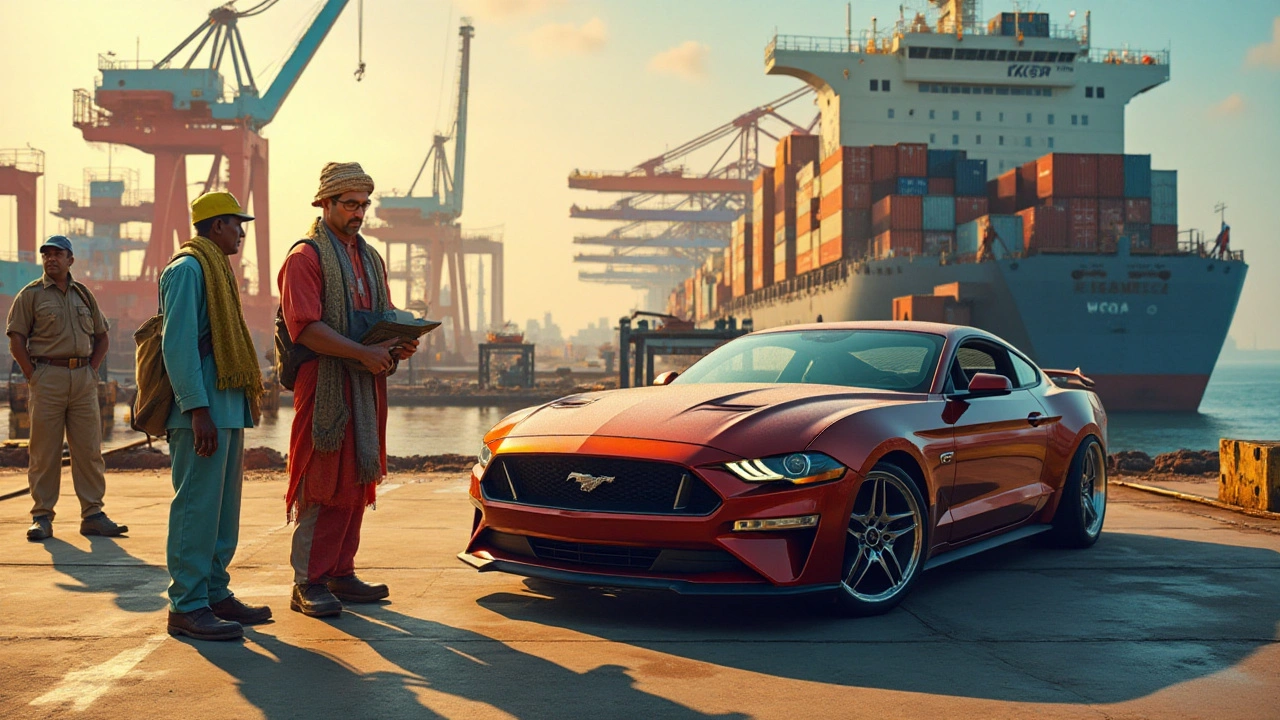Bringing a car from the USA to India can sound like an adventurous feat but one that requires careful navigation of rules and regulations. Enthusiasts often explore this option to secure unique models not available locally or to bring home a beloved vehicle. Yet, this journey involves more than just shipping a car across continents.
The process starts with comprehending the import regulations set in place by Indian authorities, which are crucial to ensuring compliance. Additionally, understanding the costs involved, including customs duties and other taxes, is essential. Transport logistics pose another piece of the puzzle, where one must carefully plan how to get the vehicle safely across the seas.
This article seeks to break down each of these components, offering you clear guidance and tips for a seamless experience. With the right information and preparation, importing your dream car from the USA to India is indeed a possibility worth exploring.
- Understanding Import Regulations
- Cost and Tax Implications
- Logistics and Shipping
- Tips for a Smooth Import Process
Understanding Import Regulations
Embarking on the journey to import a vehicle from the USA to India requires a solid grasp on the regulatory framework set forth by Indian authorities. To avoid potential pitfalls, it's imperative to acquaint yourself with the laws governing car import procedures. At the core of this process lies a series of detailed regulations that dictate the feasibility and legality of the importation process. These rules are designed not just for control but also to protect local industry, promote safety, and ensure environmental standards are met. From the outset, the vehicle must adhere to the Central Motor Vehicles Rules in India, which oversee crucial details like emissions standards and roadworthiness. It's not just about meeting these standards at point of entry; ongoing compliance is essential for continued use on Indian roads.
Another key element involves understanding the age and value restrictions on vehicle importation. Generally, cars that are more than three years old are restricted from entry. This regulation helps to ensure the modernity of technology and emission standards maintain a forward trajectory. The value of the vehicle also plays a significant role. According to Indian law, imported cars attract a hefty import duty which can range anywhere from 100% to 125% of the car's value. This means significant financial consideration must be factored in beyond the purchase price in the USA.
The ownership status of the car before exportation is also scrutinized. The Directorate General of Foreign Trade (DGFT) mandates that the importer should own the car for at least a year before importing it to India. This measure is in place to deter instant imports strictly for resale purposes and to encourage genuine personal use importation. Moreover, before proceeding, potential importers should secure an Import License, a document that authorizes the entry of goods into India. Navigating the bureaucratic lanes to procure such a license might seem daunting, but it's an essential step in the process. As one auto import consultant aptly stated,
"Understanding regulations is your roadmap to success; without it, even the best-laid plans can go awry."
Compliance with Standards
An often-overlooked factor is compliance with the Bharat Stage Emission Standards, which align with European norms. These standards are consistently updated to keep pace with global environmental policies. Non-compliant cars may face rejection upon arrival, putting importers in a difficult position. Thus, pre-import inspections to ensure adherence are highly recommended. The Bureau of Indian Standards also sets criteria for overall safety and vehicle performance. Cars that fail to meet these may require modifications before registration is allowed, which can be both time-consuming and costly. Ensuring compliance beforehand can save hassle and prevent legal complications.
Additionally, insight into the 'No Objection Certificate' (NOC) from the Pollution Control Board can provide anticipatory guidance to smooth out regulatory processes. The array of paperwork required includes a statement of compliance with the CMV rules, NOCs, and registration-proof of prolonged ownership. It's a nuanced ballet of documentation where each step plays a crucial part in the final act of successfully importing your dream car to India.

Cost and Tax Implications
Importing a vehicle from the USA to India can be an exciting endeavor, yet it's crucial to be fully aware of the financial aspects that accompany such an undertaking. Before diving into the nitty-gritty details, one must first grasp the calculations surrounding the import duties and taxes, which can significantly affect the total cost of your car import. Indian customs have a specific set of guidelines which stipulate that the cumulative amount of all applicable taxes can trump the original purchase price of the vehicle itself. This is primarily due to compound duties, where each layer of tax is applied on the accumulated cost of the previous.
For instance, import duty on cars generally can be more than 100% of the car's assessed value, which includes the FOB (Freight on Board) value and the cost of insurance and freight (CIF). You may also expect to pay an Integrated Goods and Services Tax (IGST), which furthers the financial burden. These taxes are quite steep, but they are designed to protect national industries and regulate the influx of foreign vehicles. Assessing these costs in clear, itemized details will help you make an informed decision.
As an analyst from the Society of Indian Automobile Manufacturers once mentioned, 'Understanding the tax structure and its nuances can make or break the decision to import a vehicle.'
Another financial factor to consider is the currency exchange rates, which can fluctuate during the transaction period, sometimes resulting in a higher-than-expected cost. Not to mention, insurance during transportation is also a non-negligible part of the expenditure. According to the International Federation of Freight Forwarders Associations, the right insurance coverage is not just advisable but necessary.
To lend structure to the process, let's look at a typical breakdown of costs:
| Element | Cost Percentage of CIF |
|---|---|
| Basic Customs Duty | 60% |
| Social Welfare Surcharge | 10% on Customs Duty |
| IGST | 12-18% based on vehicle category |
Additionally, port handling charges, registration fees, and potential modification costs to ensure compliance with Indian automotive regulations can further increase expenses. Given these multitude of tax layers and sometimes hidden costs, meticulous financial planning is indispensable to ensure the imported vehicle does not become a financial burden. Engaging a professional consultant or an experienced shipping agency could prove beneficial in managing these cost implications effectively. This step may seem trivial to some, but it's an investment that can save a substantial amount of effort and unanticipated financial losses down the road.

Logistics and Shipping
When it comes to importing a car from the USA to India, logistics and shipping play a crucial role. The first step in this journey is selecting a shipping method. Typically, shippers choose between Roll-On/Roll-Off (RoRo) and container shipments. RoRo is generally more cost-effective as vehicles are driven onto the vessel, but container shipping offers added security as the car is enclosed. It's vital to weigh the pros and cons of each method based on your car import needs and budget.
Securing a reliable transport company is another essential element in this process. It's best to opt for companies with extensive experience in vehicle importation to handle the paperwork, manage customs, and ensure the safe transportation of your car. These companies often provide a door-to-door service, including insurance options to cover any unforeseen damages. According to a report by the International Association of Movers, using a trusted shipping provider helps mitigate risks associated with the transport of high-value items over long distances.
"Selecting the right shipping partner can save time, money, and potential headaches. It pays to research and choose wisely," says a spokesperson from the International Car Shipping Association.
Upon arrival in India, the vehicle's entry is subject to several regulatory checks. The import process demands a meticulous documentation process where import declaration, insurance, and purchase invoices must be accurately submitted. An Importer Exporter Code (IEC) number is also needed, which can be obtained from the Directorate General of Foreign Trade. These documents ensure a smooth transition through India's customs procedures.
Cost Considerations
The cost and tax implications tied to shipping are significant and must be calculated early. Custom duties and taxes could range significantly, depending on the car's value, age, and state of origin. Typically, imported vehicles are levied a customs duty of around 125%, comprising Basic Customs Duty (BCD), Social Welfare Surcharge, and integrated GST. Some ports may levy additional charges based on local regulations. Importers are advised to consult financial advisors or use online vehicle importation calculators to estimate the total cost accurately before proceeding.
Logistics isn't limited to crossing borders; it extends into handling the nitty-gritty upon the car's arrival. Arranging transportation from the port to your desired location within India is another task on the checklist. Understanding and planning for potential obstacles in this part can prevent delays. Careful coordination with shipping agents and local transport services can help in achieving timely delivery.

Tips for a Smooth Import Process
Delving into the captivating process of importing a car from the USA to India isn't just a simple matter of shipping logistics; it’s a thrilling adventure in itself. However, the success of this endeavor largely hinges on preparation and knowledge. Firstly, familiarize yourself with the Indian government’s vehicle compliance regulations. Adherence to the Motor Vehicles Act is non-negotiable, which means your imported vehicle should meet the necessary safety and emission standards required by the Indian automotive authorities. This includes stringent testing that ensures your car aligns with any laid-down norms.
Getting your documentation right early can save you from many headaches. Ensure all papers, like the bill of lading, title certificate, and purchase invoice, are in order before the car leaves American soil. Furthermore, conformity certificates proving the car meets local roadworthiness standards are crucial. Another important aspect to smooth out ahead of time is the insurance coverage needed for transit, which must last until the car has securely arrived in India. Remember, thoroughness in paperwork today can mean peace of mind tomorrow.
Financial Planning and Budgeting
One cannot overstate the significance of budgeting when it comes to importing a vehicle. Not only do you have to account for the shipping cost, which varies based on the size and weight of the car, but there are also customs duties that can run into a hefty sum. Typically, Indian customs duties are significant and often include import duty, goods and service tax (GST), and sometimes special additional customs duty. As per some analyses, total import duties could be up to 125% of the vehicle’s cost. This figure underscores the importance of financial readiness when planning your car’s journey.
"Thorough planning and understanding of the financial commitment are the cornerstone of a successful vehicle import," notes a leading expert from the Federation of Automobile Dealers Associations in India.
Building a comprehensive budget that factors in all these financial aspects ensures no unexpected expenses derail your import venture.
Finding a Reliable Shipping Agency
An often overlooked yet crucial aspect of importing is selecting the right shipping partner. Opt for agencies with a proven track record in vehicle transport who will handle your prized car with due diligence. Experienced shippers provide guidance on necessary packaging, securing methods to prevent damage, and all relevant transit-related protocols. They will also offer invaluable advice on navigating any potential customs inspection points with ease, which can often be the most challenging parts of the process. Some shippers even partner with local Indian customs agents to ensure a seamless transition through ports, which could save you from a wealth of potential difficulties.
The commitment to thorough research and a calculated, step-by-step approach lays the groundwork for importing your dream car smoothly. With insights and advance planning, the road to successfully bringing a car from the USA to India is well within reach for dedicated enthusiasts.
